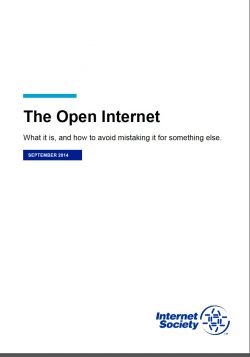It is not by chance that we have enjoyed the extraordinary success of the Internet as a global engine of economic, political, cultural, and social progress. Fundamental principles embedded in the architecture of the Internet as a collaboration among designers, builders, providers, and users led directly to this success. Sustaining it will require a commitment by today’s policy makers to understand and respect those principles—not because they are honored by time or tradition, but because they confer tangible present and future benefits.
The term “Open Internet” has been used so often and so freely that everyone knows what it means—or thinks they know what it means, and assumes that everyone else means the same thing when they use it. After all, the core enabling principle of the Internet as a system that includes users, applications, and infrastructure is openness, which infuses every aspect of the modern Internet—technical, economic, political, and social. But depending on the context in which it is used, the word open conveys different meanings, particularly when subtle (or not–so–subtle) variations are introduced by translation from one language to another; and because “openness” has become an important issue in many Internet political debates, defining what it means has become part of those debates.
As is usually the case when people understand the terms and concepts of a debate differently, it will be difficult for us to resolve important issues of Internet policy until we reconcile our different understandings of open and openness in principle and in practice. That is the objective of this paper.
